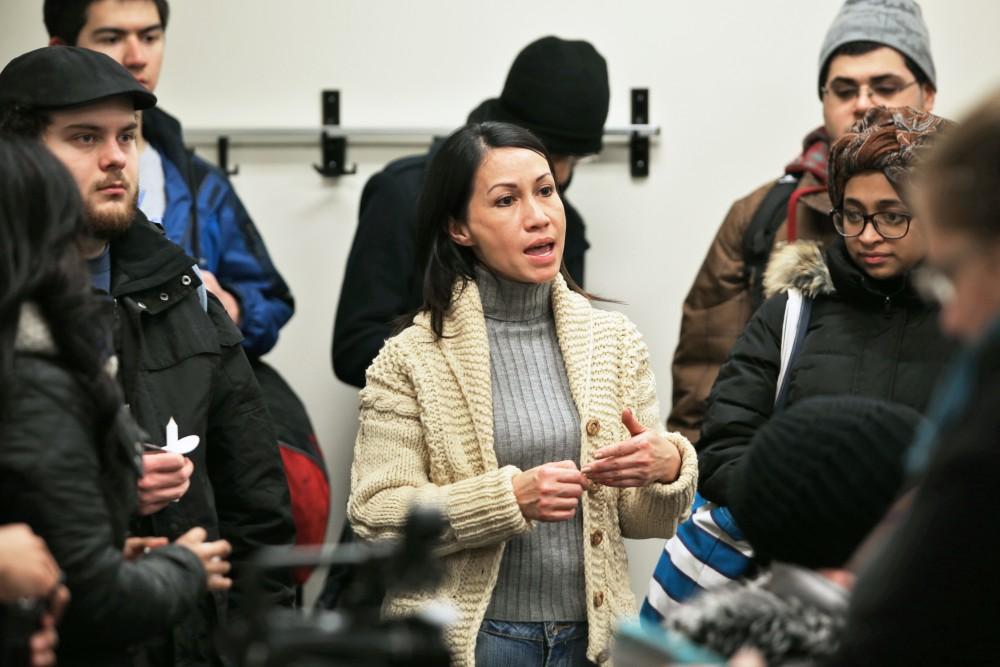Setting an example of religious diversity

GVL/Kevin Sielaff Connie Dang
Feb 22, 2015
Despite the frigid single-digit temperature, Grand Valley State University students and community members gathered at the Cook Carillon Tower Wednesday night to mourn the deaths of three young Muslim students from North Carolina.
The candlelight vigil was hosted by the Student Senate diversity affairs committee, and over 50 people attended. While the crowd consisted mostly of students, alumni and members of the At-Tawheed Islamic Center in Grand Rapids were also present.
Lakers and community members read prayers in Arabic and English. They held a moment of silence for sisters Yusor Mohammad Abu-Salha, 21, and Razan Mohammad Abu-Salha,19, as well as Yusor’s husband, Deah Shaddy Barakat, 23.
The three were killed just outside of the University of North Carolina at Chapel Hill on Feb. 10. Many considered the murders a hate crime against Muslims.
The murders of the three family members occurred at exactly the same time as GVSU students were participating in an interfaith event called We Are One, a sentiment shared by the elder of the two sisters killed in North Carolina.
In an interview Yusor recorded for StoryCorps, an oral history project, she said, “Growing up in America has been such a blessing. It doesn’t matter where you come from. There are so many different people from so many different places and of different backgrounds and religions, but here we’re all one. We’re one culture.”
As the candlelight vigil continued indoors, the conversation shifted to how GVSU can become more religiously aware and accepting.
Much of the discussion focused on the lack of dialogue at GVSU about religious diversity.
“It seems like we talk about diversity a lot, but maybe not religious diversity as much,” said Katie Gordon, the program manager for the Kaufman Interfaith Institute. “There’s a good appreciation for the issues of gender, LGBT and race on campus, but when we see something like this happen, we don’t know how to talk about it as a campus because we haven’t been talking about religion.
“We have to re-teach ourselves how we discuss religion and how to be open about it.”
Many of the students in attendance felt there was a need for a required class that teaches students about all types of diversity.
“Part of me wishes we have a mandatory class for students to take that addresses privilege and oppression, how that works in society,” said Amina Mohamed, a member of the Muslim Students Association. “I know many students who will consciously shy away from classes that make them feel uncomfortable or make them talk about situations that make them feel uncomfortable.”
Derek Zuverink, president of Better Together, an interfaith student organization, echoed Mohamed’s sentiment.
“I took Diversity in the U.S. my freshman year and I grew up in West Michigan; I was not exposed to any diversity,” Zuverink said. “Everybody in my town was white, everybody was Christian. Coming to Grand Valley, taking that course my freshman year actually changed a lot of my perspectives. I don’t believe that class is mandatory, but if we were able to have a course like that where it is required, it would be a very effective tool. It changed my opinion, it could change more people’s as well.”
Many attendees of the candlelight vigil agreed that a diversity class should be mandatory for all GVSU freshmen, showing students early on that talking about religious and other types of diversity is encouraged at the university.
However, the class was recommended for more than just students.
“Not only do students need to take a mandatory class, but teachers also need to take a mandatory class on how to know what is right to say when it comes to different religions and different races,” said GVSU student Logen Hill. “Everybody needs to learn.”
Some students noted that, in their history classes, they have felt their professors spent more time focusing on the negative aspects of Islam than the negative aspects of any other religion.
This was true for GVSU student Youser Hameed in her world history class.
“If you’re going to mention negativity of a religion, mention it for others,” she said. “You need to state the other side of the story.”
While there has been some progress toward a more religiously accepting campus and efforts by Student Senate to create a more usable inclusive prayer and meditation space, some students felt there is still a long way to go.
“I wish that there was more talk on our campus about other faiths beside Christianity,” said Shelby Bruseloff, vice president of Better Together and communications coordinator for the Kaufman Interfaith Institute. “I think that we barely talk about Islam, we barely talk about Judaism, we barely talk about all the other faiths and non-faiths that are out there.
“I wish that it was more predominant on our campus that people weren’t afraid to talk about religion.”
For those interested in contributing to the conversation about religious diversity on campus, a discussion will take place on March 18 called Hummus not Hate: Dialogue not Debate, where students will be encouraged to speak about faith and non-faith issues.
In addition, Vice Provost for Student Affairs and Dean of Students Bart Merkle encouraged students to collaborate with faculty members and present about religious diversity at the Teach-In scheduled for April 2. Presentation proposals are currently being accepted at www.gvsu.edu/teach-in.
“This conversation has really been building on campus over the last year,” Gordon said. “We need to know how to have this conversation.”

























